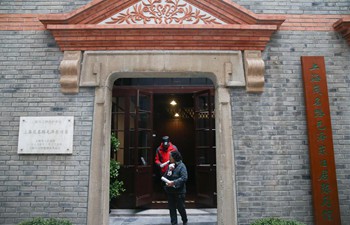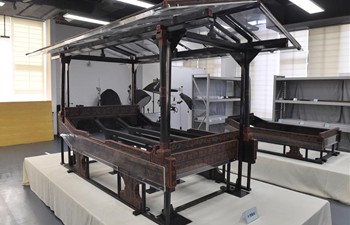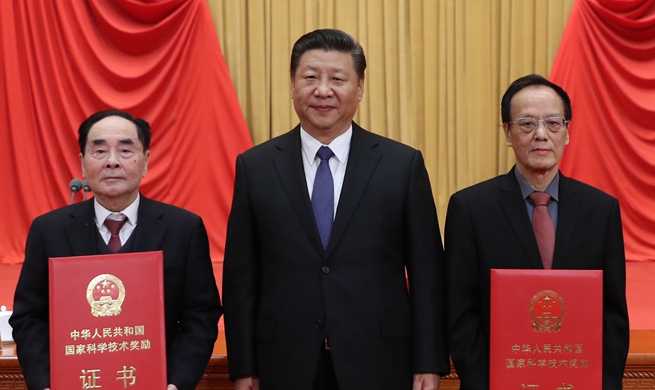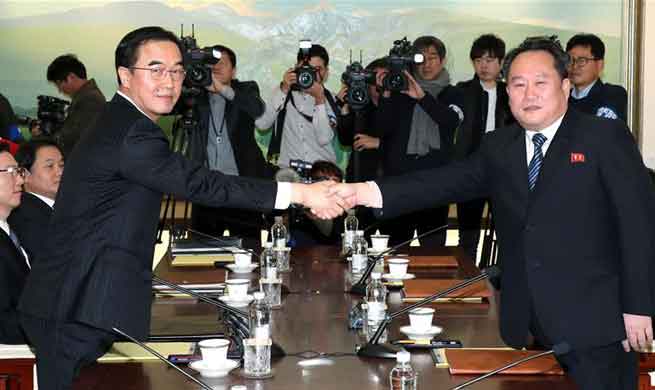BEIJING, Jan. 9 (Xinhua) -- Strengthened supervision of use of power is being extended nationwide, as China's fight against graft reaches a new level.
On Monday, the first county-level supervisory commission in southwest China's Yunnan Province began its work. One year after pilot reform began in Beijing, Shanxi and Zhejiang, other provinces are setting up commissions based on the experiences of the three regions.
The report to the 19th National Congress of the Communist Party of China (CPC) in October mandated supervisory commissions at national, provincial, city and county levels, sharing offices and staff with CPC discipline inspectors.
SPREADING THE NET WIDER
In May 2017, two months after a supervisory commission was set up in Yuxian County, Shanxi Province, an accountant with a state-owned company named Gao turned himself in.
Gao, who was not a CPC member nor a government employee, confessed that he had embezzled 740,000 yuan (113,000 U.S. dollars) to buy lottery tickets online.
"I did not realize I was supervised until we were told to report our financial status to the new commission," he said. Gao has been fired from his company post and will be prosecuted.
"The new system ensures that supervision covers everyone in the public sector who exercises power, and has been a great deterrent," said Zhao Lei, professor with the Party School of the CPC Central Committee.
The commissions integrate government supervision departments with those procuratorate offices that dealt with corruption prevention, bribery, dereliction of duty and other duty crimes. The supervisory commissions are authorized to investigate and punish both public employees and anyone deemed to hold public power: those working in state-owned enterprises, schools, hospitals, etc.
Compared with the former system in which CPC inspectors supervised CPC members and government departments supervised government workers, the new commissions include a much broader range of people in the public sector, said Ren Jianhua, director of the Shanxi supervisory commission.
Non-CPC members and those who exercise power on behalf of the government but are not government employees are now potential targets under the new rules, he said. The number of people subject to supervision in Shanxi Province increased by more than 18 percent to around 3 million. Pilot regions of Beijing and Zhejiang also saw big increases in the number of people under supervision.
Chen Mingjie, with the CPC Beijing municipal discipline inspection commission, believes the system is now more streamlined, uniform and efficient.
Former CPC discipline inspectors and prosecutors in charge of hunting for fugitive suspects in duty-related crimes were restructured into a new department in the supervisory commission.
"The unified effort helped apprehend 32 fugitives from overseas in 2017, twice the number we caught in 2016," Chen said.
ENSHRINED IN LAW
Draft supervision legislation to be submitted to the first session of the 13th National People's Congress (NPC) for deliberation in March is expected to write the supervisory commissions into law.
The draft, already reviewed twice by the top legislature, includes major revisions standardizing a detention system to replace "shuanggui," a Party disciplinary practice that requires a Party member under investigation to cooperate with questioning at a designated place and time.
"Supervisory reform in the three pilot regions has provided references for other regions. The extended pilot reform will help push the legislation process, paving the way for the establishment of a national supervisory commission," said Ma Huaide, vice president of the China University of Political Science and Law.

















